[ by Charles Cameron — tracing the same tale from Ibrahim challenging Nimrod as quoted in Dabiq back to Midrash Rabbah ]
.
I ended my last post, An end times update & the Islamic State, with a DoubleQuote:

Sources:
Foreign Policy, In a New Ukraine, the Sun Rises in the West
Discovering Islam, Rising of the Sun from the West
**
But then, d’oh, a new issue of Dabiq comes out, and on p 4 there’s a reference to Qur’an 2.258:
Have you not considered the one who argued with Ibrahim about his Lord [merely] because Allah had given him kingship? When Ibrahim said, “My Lord is the one who gives life and causes death,” he said, “I give life and cause death.” Ibrahim said, “Indeed, Allah brings up the sun from the east, so bring it up from the west.” So the disbeliever was overwhelmed [by astonishment], and Allah does not guide the wrongdoing people [Al-Baqarah: 258].
What’s that book title? The Sun Also Rises…
**
That’s quite an intriguing exchange, you know, for Dabiq to be quoting — especially considering that Ibrahim is the caliphal name of al-Baghdadi, that Dabiq preaches the millah Ibrahim, and so forth.
There’s more to the story, of course.
The Qur’an 21.51-71 goes into more detail:
We gave Abraham aforetime his rectitude — for We knew him — when he said to his father and his people, ‘What are these statues unto which you are cleaving?’ They said, ‘We found our fathers serving them.’ He said, ‘Then assuredly you and your fathers have been in manifest error.’ They said, ‘What, hast thou come to us with the truth, or art thou one of those that play?’ He said, ‘Nay, but your Lord is the Lord of the heavens and the earth who originated them, and I am one of those that bear witness thereunto. And, by God, I shall assuredly outwit your idols, after you have gone away turning your backs.’ So he broke them into fragments, all but a great one they had, for haply they would return to it. They said, ‘Who has. done this with our gods? Surely he is one of the evildoers.’ They said, ‘We heard a young man making mention of them, and he was called Abraham.’ They said, ‘Bring him before the people’s eyes; haply they shall bear witness.’ They said, ‘So, art thou the man who did this unto our gods, Abraham?’ He said, ‘No; it was this great one of them that did it. Question them; if they are able to speak!’ So they returned one to another, and they said, ‘Surely it is you who are the evildoers.’ Then they were utterly put to confusion saying, ‘Very well indeed thou knowest these do not speak.’ He said, ‘What, and do you serve, apart from God, that which profits you nothing; neither hurts you? Fie upon you and that you serve apart from God! Do you not understand?’ They said, ‘Burn him, and help your gods, if you would do aught.’ We said, ‘O fire, be coolness and safety for Abraham!’ They desired to outwit him; so We made them the worse losers, and We delivered him, and Lot, unto the land that We had blessed for all beings.
And behind that telling o the story, there’s the Midrash Rabbah, in which we read [p. 311] that Abraham mocked customers of his father’s idol-manufacturing business, with the result that his father handed him over to the King, Nimrod — himself an idolater:
Thereupon he seized him and delivered him to Nimrod. ‘Let us worship the fire’ he [Nimrod] proposed. ‘Let us rather worship water’, which extinguishes the fire,’ replied he. ‘Then let us worship water!’ ‘Let us rather worship the clouds which bear the water.’ ‘Then let us worship the clouds!’ ‘Let us rather worship the winds which disperse the clouds’ ‘Then let us worship the wind!’ ‘Let us ratherworship human beings, who withstand the wind.’ ‘You are just bandying words,’ he exclaimed; ‘We will worship naught but the fire. Behold, I will cast you into it, and let your God whom you adore come and save you from it.’ Now Haran was standing there undecided. If Abram is victorious, [thought he], I will say that I am of Abram’s belief, while if Nimrod is victorious I will say that I am on Nimrod’s side. When Abram descended into the fiery furnace and was saved, he [Nimrod] asked him, ‘Of whose belief are you?’ ‘Of Abram’s,’ he replied. Thereupon he seized and cast him into the fire; his inwards were scorched and he died in his father’s presence. Hence it is writteN, AND hARAN DIED IN THE PRESENCE OF (‘AL PENE) HIS FATHER TERAH
**
I shall have more to say about Dabiq 5 in further posts — the whole magazine is a bit much to digest at once.





